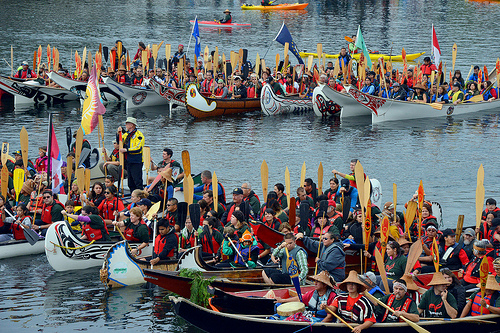As the Truth and Reconciliation Commission wraps up its Vancouver hearings into residential school abuses Saturday, organizers of a week of public events are renewing their call for 50,000 people to take to the streets Sunday as a symbol of reconciliation.
The four days of testimony are the latest national event gathering painful stories from those who survived the church-run schools, the last of which closed in 1996 amidst revelations of widespread sexual and physical abuse across the country.
And though controversy has swirled over pipeline giant Kinder Morgan’s sponsorship of the TRC itself, as well Keystone XL proponent TransCanada’s partnership with the organization Reconciliation Canada, the founder of that group insisted that all voices belong at the table.
“We wanted to elevate the profile of the Truth and Reconciliation Commission, because it’s been flying under the radar,” said Chief Robert Joseph, the group’s founder. “We want more Canadians to know about it, so they can begin to engage with each other.
“We want to shift the language towards reconciling with each other. After 17 years, it’s time to start the dialogue. If we never start, we’ll still only be looking at the past and not creating any new understanding.”
For Squamish and Kwakwa̱ka̱’wakw activist Khelsilem Rivers, the links to energy corporations facing massive opposition from First Nations is deeply troubling, a “contradiction” that he said prevented some Indigenous people from attending events that remain important for survivors.
“We are working to fight these pipelines and companies,” he said. “Does our involvement in these events mean we are giving a pass to these companies and their record?”
“There’s issues around solidarity and support for the local communities who are going to be affected by the proposed pipelines and resource extraction. There’s a question of genuineness.”
Reconciliation Canada said that there are “absolutely no strings attached” to TransCanada’s funding, which amounts to roughly five per cent of the organization’s budget. The company is expected to attend dialogue circles on healing wounds of the past, the group added.
“The only way we can move forward is if, as Canadians, we embrace each other with all our diversity and honour our uniqueness and differences,” Joseph said. “Over time, it’s going to pave a new way forward. That’s the emphasis — not to forget about the sad and tragic history of Residential Schools.”
“Nothing will change unless we change our own mindset, who we are, and where we want to go in the future. Otherwise, there’s a danger we might just languish in resentment, anger and darkness.”
For UBC First Nations Studies professor Glen Coulthard, Reconciliation Week and public walks like Sunday’s are an opportunity to foster more critical conversations about Canada’s oppression of Indigenous Peoples – but must not overshadow the fact that colonialism continues today, through such projects as oil sands pipelines, resource extraction, and treaties which attempt to remove First Nations title and authority over their lands.
“The whole discourse of reconciliation is down on so-called negative emotions like anger,” the Yellowknives Dene scholar said. “I actually think that to prematurely demand that Indigenous Peoples get over their anger and move on, in the context of ongoing oppression, is a harmful attitude to take.”
“We have to not be dismissive of this. For survivors of Residential Schools, some of them will find comfort in this, and see it as a genuine move towards something better … But, as a spectacle from the city or federal government, it doesn’t come with any commitment or necessary change on the part of Canadians or the Canadian government.”
Reconciliation Canada acknowledged such criticisms, Joseph responded, adding that his message is not that aboriginal people stop fighting for equality or justice. Rather, righting broken relationships is seen as key to doing that healing work together.
As a residential school survivor himself, Joseph recalled the brokenness many have been left with, including intergenerational trauma with tragic legacies today. “I was so broken,” he recalled. “As a little boy, people treated me as nothing.”
“I was so full of despair, and as I grew up I had no value. I fell into alcoholism and brokenness. I don’t think anybody should live there … I’ve seen the destruction and devastation left by colonialism on a race of people. Those of us who grew up in those times were broken. It led to resentment, hostility, anger, and being left out.”
Talking about reconciliation, Joseph said, is not to forget the past.
“We won’t,” he said. “But let’s move from that place of darkness and harm, and find a new way forward that’s mutual and collaborative. That’s the vision.”
For Coulthard, engaging in bridge-building activities like Sunday’s walk or the TRC events are a chance to raise “critical conversations” about ongoing settler colonialism, as long as reconciliation isn’t “just uncritically taken at face value” or imposed on Indigenous people.
“To that end, we can both participate in the events, and spark important conversations with our neighbours on these issues.”
Reconciliation Week wraps up with a walk starting 9 a.m. at Queen Elizabeth Plaza in Vancouver, on Sunday, September 22. For more information about the walk, visit reconciliationcanada.ca.
David P. Ball is a writer and photojournalist in Vancouver, on unceded Coast Salish land.
Photo: Sherwood411 / flickr




